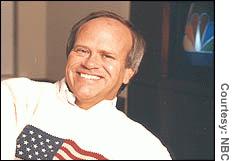|
Ready to pay for some football?
|
 |
January 25, 2002: 1:40 p.m. ET
NBA TV deal shows that big games, like Super Bowl, are headed to pay TV.
A twice weekly column by Staff Writer Chris Isidore
|
NEW YORK (CNN/Money) - This Sunday and next, when you and much of the nation gather to watch the National Football League's conference championships and Super Bowl XXXVI, keep this in mind -- your days of being able to see those kinds of major sporting events on free broadcast television are numbered.
It won't happen next year, or the year after that, maybe not even for V or X years (also known as five or 10 years for those non-Super Bowl fans out there). But I'll be willing to bet the cost of a pay-per-view event that the Super Bowl will stop being shown on a free broadcast network before my favorite team, the Buffalo Bills, finally figures out a way to win the big game.
NFL executives insist that they are committed to keeping the games on free television. But the people who ultimately have to make the decision -- the network executives who make the bids for the events -- recognize that the battle to keep major sporting events off of cable has already been fought, and the broadcast networks have lost.
"I'm sure the NFL would prefer to keep everything on broadcast TV," one network official told me this week. "Can they? I don't know. They've got owners who want the most money possible, and they don't care how they get it."

|
|
|
NBC Sports Chairman Dick Ebersol says broadcasters can no longer compete with cable television for major sports rights contracts. | |
Dick Ebersol, the chairman of NBC Sports, gave what amounted to a concession speech marking the end of the battle between broadcast and cable this past week, when his network lost the rights to the National Basketball Association games.
The NBA struck a reported $4.6 billion, six-year deal with ABC, its sports cable affiliates at ESPN, and Turner Broadcasting, which like CNN/Money is a unit of AOL Time Warner Inc. (AOL: Research, Estimates). Turner will not only continue to put games on its existing cable channels, but will create an all-NBA station.
More importantly, the deal increases the annual rights fees by an estimated 24 percent over the $2.5 billion NBC and Turner paid the last four seasons, despite declining revenue, by putting the majority of postseason basketball games on cable, along with the All-Star Game. Only up to a dozen games of pro basketball's all-important "second season" will be on ABC, including the best-of-seven championship round.
Ebersol admitted that the loss of the rights contract was painful for NBC, but said that broadcast networks no longer can compete with cable stations.
"For the first time a major sports property has largely migrated from network to cable, where the dual revenue streams of subscriber fees and advertising can support the escalating costs of broadcast sports rights," Ebersol said. "In the future, it will become almost impossible for broadcast television sports to match the power of those 'sub' fees, which are unique to the cable world."
The shift to cable is something that broadcast executives have seen coming for years. The only surprise with the NBA contract is that is happened now, rather than five or six years from now. Many thought there was one more big broadcast contract left. There wasn't.
The decline in all sports ratings and the instability of the advertising market are two more factors favoring cable over broadcasters when bidding for major sports contracts.
For example, the network that will air this year's Super Bowl, Fox, had to cut back on the pre-game program due to lack of advertiser demand, and it still has sold only about 90 percent of the available ad time, just a little more than a week before the big game. Fox Entertainment Group (FOX: Research, Estimates), which is paying $4.4 billion over eight years to broadcast NFC games and half the Super Bowls during that time, has been seeking about $2 million for a 30-second spot on this year's big game, but is unlikely to get that for the remaining time.
That's not surprising, given the economic recession, says Lou D'Ermilio, a spokesman for Fox Sports. He predicts the network will sell out, but concedes that relying on advertising when bidding billions for major events is a risky business model. "Rights fees in the future are going to have to make economic sense for whatever entity is bidding on them," he said. "It would seem that having a dual revenue stream would be an advantage."
There was a time when major events going to cable would have locked out much of the country's fans, and more important for the leagues, much of the advertisers' preferred viewers. Not anymore.
About 88 million homes, or 83 percent of homes with television, have cable or satellite television. That means that the viewership, and ad revenue, won't take a major hit when shifting to cable.
Click here for CNNSI.com
As more and more homes get cable, that potential ad revenue loss declines further, along with any economic argument for keeping the games on broadcast stations. Eventually, families without cable will be those who don't care much about sports, or those with lower income, who are less important to advertisers.
Of course each broadcast network has its own extensive cable outlets. The networks have found that moving sports to non-sport cable channels is a viable option. NBC is showing about 55 percent of its Olympic coverage on CNBC and MSNBC, typically both news stations. Viacom's CBS has put the early rounds of some of the sporting events it shows on the USA Network, a general entertainment cable outlet. Last year Fox put some baseball playoff games on Fox Family.
But ABC, with its bevy of sports-oriented ESPN stations, has a tremendous advantage now in bidding for sports contracts and being able to split the event between broadcast and cable. Until the other broadcasters build up a competing sports cable franchise, it gives the Walt Disney Co. unit a leg up in the new world of sports broadcasting.
"ESPN is probably one of the more valuable franchises," said Gene DeMark, partner at consultant KPMG LLP. "This helps them quite a bit. It (the NBA deal) is a pretty good transaction."
Right now the broadcasters' ability to split major events between free and cable is the best thing going for those without cable who want to watch major sporting events. But that could change, especially if sports ratings continue to slip and new media players without a broadcast outlet, such as Turner Sports, continue to grow. A spokesman there said sports fans can expect it to be a bidder for major sporting contracts, including championship games.
"Will that happen? I don't know," said Greg Hughes, spokesman for Turner Sports. "Ten years ago nobody would have said NBA All-Star game would be on cable. We hope to have events like those on TNT or TBS for sure." 
Click here to send mail to Chris Isidore
|
|
|
|
|
|

|

